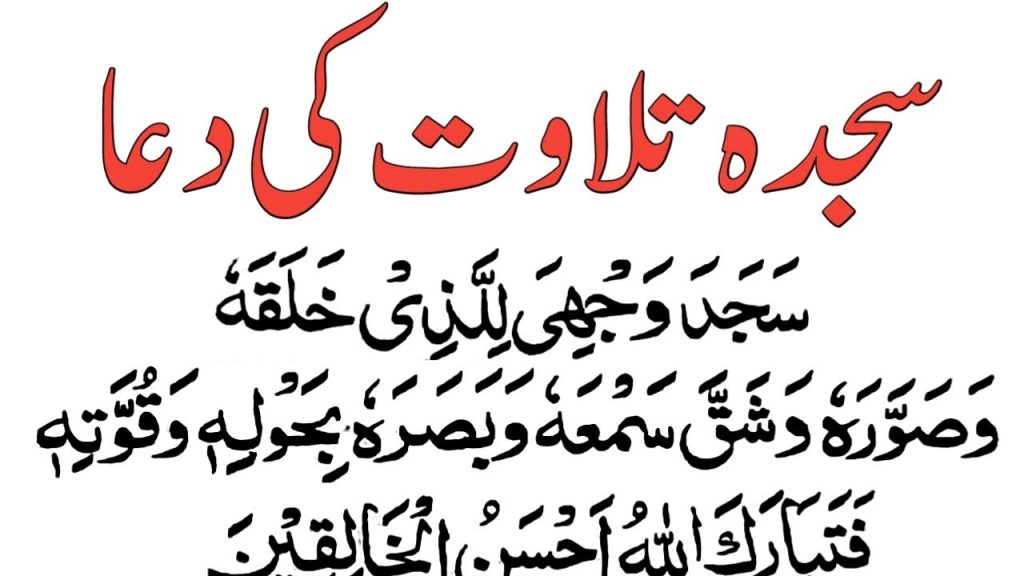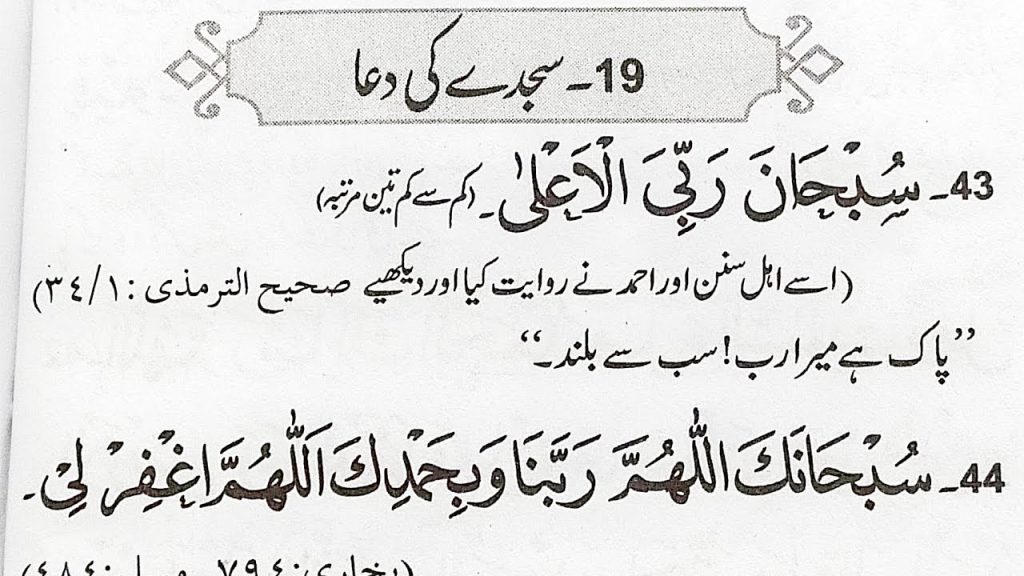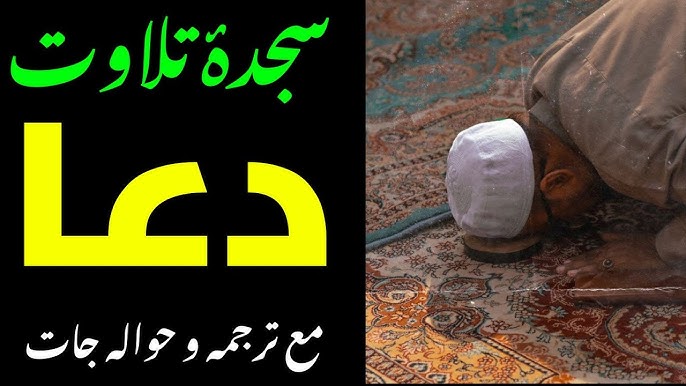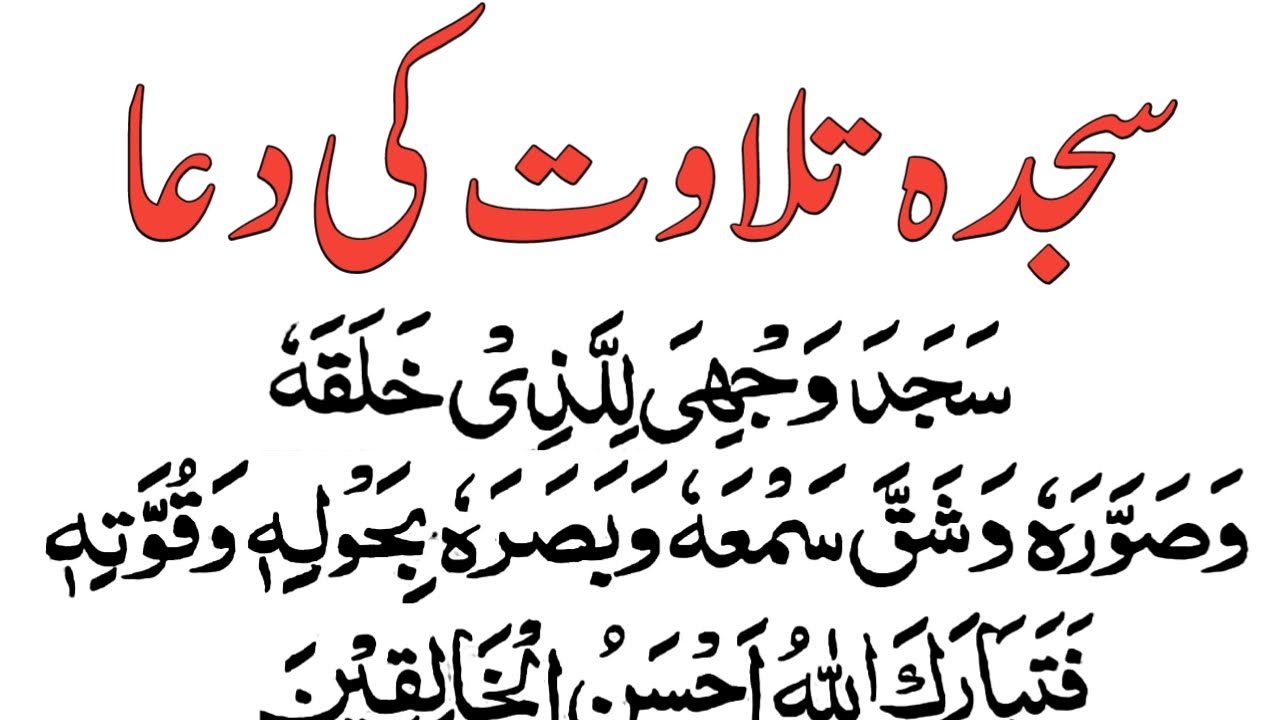Introduction
- Hook: Sujood is nearest to Allah, and Sajde ki dua holds immense spiritual importance.
- Present the concept of Sajde ki dua and where it exists in the Quran and in regular prayer.
What is Sajde Ki Dua?
- Define Sajde ki dua—the prayer recited while prostrating (sujood) when coming across a verse of sajdah in the Quran.
- Define the distinction between Sajda in Salah and Sajda Tilawah (prostration on reading/hearing specific verses of the Quran).
- Insert Arabic + transliteration + translation of dua:
Arabic:
سَجَدَ وَجْهِيَ لِلَّذِي خَلَقَهُ وَصَوَّرَهُ وَشَقَّ سَمْعَهُ وَبَصَرَهُ بِحَوْلِهِ وَقُوَّتِهِ
Transliteration:
Sajada wajhiya lilladhī khalaqahu wa sawwarahu wa shaqqa sam’ahu wa baṣarahu biḥawlihi wa quwwatihi
Translation:
“My face has bowed before Him who created it, shaped it, and gave it hearing and sight by His power and might.”

Why Is Sajde Ki Dua Significant in the Quran?
- Importance of sujood in the Quran: More than 14-15 locations in the Quran need a physical prostration.
- Sajda is a highly religious action, symbolizing submission, humility, and obedience to Allah.
- Tell them that whenever we encounter a sajdah verse, we’re being called to perform sajda both physically and spiritually.
- Refer to one or two hadiths (e.g., of Abu Dawud or Tirmidhi) about the merit of Sujood and Sajde ki dua.
Sajda Tilawah Verses of the Quran
- List the 14 confirmed Sajdah Ayahs (optional to list all references or a condensed table).
- Examples: Surah Al-A’raf (7:206), Surah Ar-Ra’d (13:15), Surah Al-Isra (17:109), etc.
- Explain that recitation of any of these verses has to be followed by Sujood Tilawah and Sajde ki dua.
Sajde ki Dua in Namaz (Sujood Ki Dua in Salah)
During sajde ki dua (prostration) in salah, the Prophet Muhammad ﷺ taught a beautiful and powerful dua to be recited. Here’s the most common one:
Arabic:
سُبْحَانَ رَبِّيَ الأَعْلَى
Transliteration:
Subḥāna Rabbiyal-A‘lā
Translation:
“Glory is to my Lord, the Most High.”
Optional Longer Duas from Sunnah (if you’ve mastered the basic one):
1.
اللَّهُمَّ اغْفِرْ لِي ذَنْبِي كُلَّهُ، دِقَّهُ وَجِلَّهُ، وَأَوَّلَهُ وَآخِرَهُ، وَعَلَانِيَتَهُ وَسِرَّهُ
Allahummaghfir lī dhanbī kullahu, diqqahu wa jillahu, wa awwalahu wa ākhirahu, wa ‘alāniyatahu wa sirrahu
“O Allah, forgive me all my sins, small and great, first and last, open and secret.”Ruling:
- It is Sunnah to recite Subḥāna Rabbiyal-A‘lā three times or more in each sajda.
- You may add other duas from the Sunnah in sajda outside of the obligatory prayers.
Here’s a complete guide to duas in sajdah — including Quranic sajdah, Hadith-based sujood duas, fard salah supplication, and Sajda Tilawat dua in Arabic — all explained point by point.
Dua for Sajde ki dua in Quran (Sajda Tilawat Ki Dua)
When reciting or hearing a verse of sajdah (14 or 15 verses in the Qur’an), it is Sunnah to perform Sujood (Tilawah) and say the following dua:
Arabic:
سَجَدَ وَجْهِيَ لِلَّذِي خَلَقَهُ وَصَوَّرَهُ وَشَقَّ سَمْعَهُ وَبَصَرَهُ بِحَوْلِهِ وَقُوَّتِهِ فَتَبَارَكَ اللَّهُ أَحْسَنُ الْخَالِقِينَ
Transliteration:
Sajada wajhiya lilladhī khalaqahu wa ṣawwarahu wa shaqqa sam‘ahu wa baṣarahu biḥawlihi wa quwwatihi fatabārakallāhu aḥsanul-khāliqīn.
English Translation:
“My face has prostrated to the One who created it, shaped it, and brought forth its hearing and sight by His power and might. So blessed is Allah, the Best of Creators.”
sajda tilawat ki dua with urdu translation
Here is the Dua for Sajda Tilawat (سجدہ تلاوت کی دُعا) with Arabic, transliteration, and Urdu translation:
sajde ki dua in Arabic (سجدہ تلاوت کی دُعا):
سَجَدَ وَجْهِيَ لِلَّذِي خَلَقَهُ وَصَوَّرَهُ وَشَقَّ سَمْعَهُ وَبَصَرَهُ بِحَوْلِهِ وَقُوَّتِهِ، فَتَبَارَكَ اللَّهُ أَحْسَنُ الْخَالِقِينَ
Transliteration:
Sajada wajhiya lilladhī khalaqahu wa ṣawwarahu wa shaqqa sam‘ahu wa baṣarahu biḥawlihi wa quwwatihi, fatabārakallāhu aḥsanul-khāliqīn.
Urdu Translation:
میرا چہرہ اُس ذات کے لیے سجدہ ریز ہوا جس نے اُسے پیدا کیا، اُسے درست شکل دی، اور اُس کے لیے سماعت و بصارت بنائی، اپنی طاقت اور قدرت سے۔ پس بڑا بابرکت ہے اللہ، سب سے بہترین پیدا کرنے والا۔
کب پڑھیں؟
یہ دعا قرآنِ پاک میں سجدہ والی آیت (آیتِ سجدہ) پڑھنے یا سننے کے بعد سجدہ تلاوت میں پڑھی جاتی ہے۔
Dua in Sajdah—From Hadith
In sujood, Prophet Muhammad ﷺ would make many beautiful duas. The main hadith-based dua is
Arabic:
سُبْحَانَ رَبِّيَ الأَعْلَى
Transliteration:
Subḥāna Rabbiyal-A‘lā
Meaning:
“Glory is to my Lord, the Most High.”
🔹 Source: Sahih Muslim, Sahih Bukhari — The Prophet ﷺ would say this 3 times or more during every sajda in prayer.

Dua in Sujood During Fard Salah
In fard (obligatory) salah, you should at least say:
سُبْحَانَ رَبِّيَ الأَعْلَى (Subḥāna Rabbiyal-A‘lā)
You can also add extra duas after this — especially in the last sajda of the final rak’ah — though this is more common in sunnah/nafl prayers, not always during fard (depending on school of thought).
Some examples from Hadith:
Example 1:
اللَّهُمَّ اغْفِرْ لِي
Allahummaghfir lī
“O Allah, forgive me.”
Example 2:
اللَّهُمَّ لَكَ سَجَدْتُ، وَبِكَ آمَنْتُ، وَلَكَ أَسْلَمْتُ…
“O Allah, to You I have prostrated, in You I have believed, and to You I have submitted…”
📘 4. Sajda Tilawat Ki Dua in Arabic – Explained in Points
| 🔢 | 📝 Explanation |
|---|---|
| 1 | سَجَدَ وَجْهِيَ (My face prostrates)—physical sign of submission and humility to Allah. |
| 2 | لِلَّذِي خَلَقَهُ (To the One who created it)—recognizing Allah as the Creator. |
| 3 | وَصَوَّرَهُ (and shaped it)—acknowledging His perfect design. |
| 4 | وَشَقَّ سَمْعَهُ وَبَصَرَهُ (gave it hearing and sight)—thanking Allah for faculties. |
| 5 | بِحَوْلِهِ وَقُوَّتِهِ (by His might and power)—declaring full dependence on Allah. |
| 6 | فَتَبَارَكَ اللَّهُ (So blessed is Allah)—glorifying Him. |
| 7 | أَحْسَنُ الْخَالِقِينَ (Best of admiring His matchless creativity |
When and How to Perform Sajda Tilawah
- Step-by-step instructions
- There is no need for niyyah, but one must understand why they are performing the sajda.
- Say “Allahu Akbar” and go into sajda.
- Recite Sajde ki dua.
- Stand up without uttering “Allahu Akbar” (according to the school of thought).
- Cite rules: in Salah, not in Salah, with wudu, without wudu, etc. (according to school of thought, e.g., Hanafi vs. Shafi’i).

Benefits of Reciting Sajde Ki Dua
- Spiritual humility and closeness to Allah.
- Adhering to the Sunnah and following the Prophet ﷺ.
- Transfers peace, clarity, and love for the Quran.
- Reassures the heart and softens it towards divine truth.
✅ Use “Sajde ki dua” only once here.
Avoid Making These Common Mistakes
- Exclusion of Sajdah Ayahs during recitation.
- Not performing Sajde ki dua in a proper manner or substituting it inappropriately.
- Not doing the sajda at all due to ignorance.
sajdy ki dua
Subhana Rabbiyal A’la:
سُبْحَانَ رَبِّيَ الْأَعْلَى
Translation: “Glory is to my Lord, the Most High.”
Subbuhun Quddusun Rabbul-Mala’ikaati war-Ruh:
سُبُّوحٌ قُدُّوسٌ رَبُّ الْمَلَائِكَةِ وَالرُّوحِ
Translation: “Glorified, Holy, Lord of the angels and the Spirit.”
Allahumma Laka Sujoodi:
اللَّهُمَّ لَكَ سُجُودِي
Translation: “O Allah, to You is my prostration.”
Subhana Dhil-Izzati wal-Jabaroot:
سُبْحَانَ ذِي الْعِزَّةِ وَالْجَبْرُوتِ
Translation: “Glory is to the Possessor of Majesty and Honor.”
Allahumma Anta Rabbi La ilaha illa Anta:
اللَّهُمَّ أَنْتَ رَبِّي لَا إِلَٰهَ إِلَّا أَنْتَ
Translation: “O Allah, You are my Lord, there is no deity except You.”
Keep in mind that the sample phrases below are quite common; you also should try to speak your own heart to Allah during sajda-sharing what’s been building up inside, your thanks, and whatever you feel is lacking in your life.
Benefits of Sajde Ki Dua
In Islam, the supplications during sajda, or prostration, have their spiritual merits and are taken as the height of being closer to Allah. Below are some of the benefits one may get from sajda ki duaen:
Deep Humility: Sajda is a physical manifestation of humility, and the duas made during this position reflect the worshiper’s acknowledgment of his state of servitude and subordination before Allah. It is said to instill and inculcate a character of humbleness and modesty in a person’s personality.
Sajda is a special time to have direct conversation with Allah. The dua made while prostrating allows the Muslims to directly have their deepest thoughts, needs, and desires conveyed to the Creator.
Forgiveness and Repentance: Sajda is considered the time when a believer may seek repentance and forgiveness of one’s sins. These supplications during this act are generally directed for Allah’s mercy and pardon.
Gratitude and Thankfulness: One often finds praise for the blessings and favors bestowed by Allah in most of the duaen in sajda. This helps instill in the believer the habit of reflecting upon their blessings and appreciating the goodness in life.
Spiritual Cleansing: Prostration, along with the duaen recited during this act, is believed to have the effect of cleansing the soul from corruption. One of the most recurrent themes in these supplications is seeking forgiveness and purification from sins.
Protection from Evil: Some duaen while in sajda may include appeals for protection from harm, evil, and trials. The believers ask for Allah’s protection against physical and spiritual challenges.
Guidance and Wisdom: A great number of duaen made during sajda relate to seeking guidance, wisdom, and understanding. This proves an indication of human dependence upon Allah to show the path in treading along life’s complexities.
Dua in sajda reinforces faith and dependence on Allah. That is where the believer implores Allah, knowing full well that He has wisdom and capability and that his prayers are heard and answered.
Connection with Allah’s Names and Attributes: Most of the duas said in sajda mention specific names and attributes of Allah, especially those relevant to mercy, forgiveness, and benevolence. This looks to deepen the understanding of Allah’s qualities that the worshiper applies.

AoA, my name is Abd al-Rahman, and my vision is to spread the knowledge of the Quran to everyone. I am proud and tall while standing as your trusted mentor on the journey of learning and memorizing the Holy Quran. I, along with a committed team of Islamic teachers, am bound to provide an easy online facility for Islamic studies and Hifz programs.

